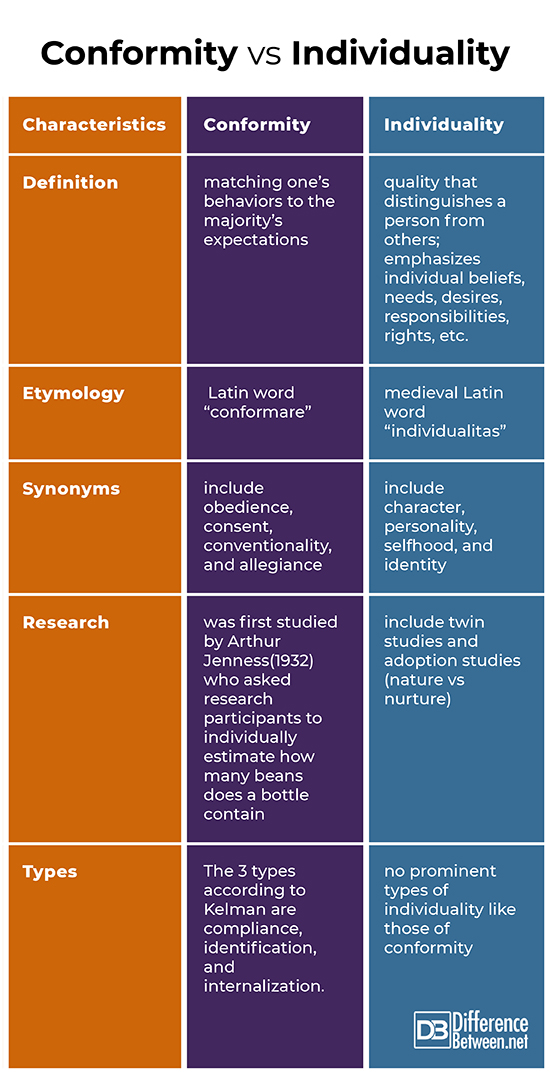Difference Between Conformity and Individuality
Both individuality and conformity are essential in society. They involve behaviors which are related with the expression of one’s feelings and thoughts. Hence, these concepts are often associated with psychology, sociology, and philosophy. Specifically, conformity is a social influence which involves compliance with group norms or laws while individuality refers to the quality that distinguishes a person from others. The following discussions further delve into their differences.

What is Conformity?
“Conformity” came from the Latin word “conformare” which means “to form”. It is matching one’s behaviors to the majority’s expectations or the compliance with group norms or laws. This type of social influence was first studied by Arthur Jenness(1932) who asked research participants to individually estimate how many beans does a bottle contain. The participants were then ushered into a room where they were asked to estimate the number of beans as a group. After the group discussion, Jenness asked the participants individually if they would like to change their initial estimate; almost all of them changed their original answers to be closer to the group’s estimation. Ergo, people’s judgements are significantly influenced by the majority’s opinions, particularly in vague situations.
The following are the three types of conformity according to Kelman:
- Compliance
It is a temporary behavior change since the compliance stops when there is no group pressure. This happens when an individual accepts the influence even if he does not personally agree; he complies because he aims to receive a favorable response (such as approval) from the group. For example, a guest, who got invited to a birthday party, does not really like eating vegetables. However, he ate a lot of vegetable salad to please his vegan host and his family.
- Identification
This occurs when an individual adjusts his behavior to be able to be a member of a certain group. This is stronger as compared to compliance since it involves public and private conformity; however, it may stop when the individual leaves the group. For example, a foreign student adopted a new way of life; however, he went back to his previous culture when he went back to his own country.
- Internalization
This happens when an individual is intrinsically motivated to accept the influence because he agrees with the ideas and actions involved. In this case, compliance is also both public and private. This is the deepest type since the behavior change is relatively permanent. For instance, someone who got invited to a church service by his friends eventually became a Christian and changed his lifestyle.

What is Individuality?
“Individuality” came from the medieval Latin word “individualitas” which refers to the quality that distinguishes a person from others. It emphasizes that a certain individual has his own beliefs, needs, desires, responsibilities, rights, etc. This concept is concerned with the forces which help us develop into distinct beings. It is also associated with diversity since it values uniqueness and depth. Every human being has a certain level of individuality and its loss can significantly injure a society. For example, a workplace which does not value the employees’ gender identities, religions, and socio-economic status will likely lead to a decrease in job satisfaction and performance.
Regarding personality, psychologists who focus on human individuality look into the explanations and processes of patterns of behavior and experience. One classic example is the nature vs nurture debate; it tries to verify whether genes or the environment is more powerful in dictating the consistencies of our behavior. For instance, twin studies and adoption studies have been conducted to help identify what makes people different from each other. Moreover, this field studies traits which sets humans apart from animals.
Difference between Conformity and Individuality
Definition
Conformity is the compliance with group norms or laws. It is matching one’s behaviors to the majority’s expectations to fit in. Individuality refers to the quality that distinguishes a person from others. It emphasizes that a certain individual has his own beliefs, needs, desires, responsibilities, rights, etc.
Etymology
“Conformity” came from the Latin word “conformare” which means “to form” while individuality came from the medieval Latin word “individualitas”.
Synonyms
The synonyms of conformity include obedience, consent, conventionality, and allegiance while those of individuality include character, personality, selfhood, and identity.
Research
Conformity was first studied by Arthur Jenness(1932) who asked research participants to individually estimate how many beans does a bottle contain. In comparison, psychological studies which are related with individuality include twin studies and adoption studies (nature vs nurture).
Types
The three types of conformity according to Kelman are compliance (temporary behavioral change to receive a favorable reaction), identification (to be a member of a certain group but may stop when the individual leaves), and internalization (intrinsically motivated and relatively permanent behavioral change). On the other hand, there are no prominent types of individuality like those of conformity.
Conformity vs Individuality

Summary
- Both individuality and conformity involve behaviors which are related with the expression of one’s feelings and thoughts.
- The three types of conformity are compliance, identification, and internalization
- Conformity is the compliance with group norms or laws while individuality refers to the quality that distinguishes a person from others.
- “Conformity” came from the Latin word “conformare” and is synonymous with obedience and conventionality while individuality came from the medieval Latin word “individualitas” and is synonymous with personality and identity.
- Conformity was first studied by Jenness while studies which are related with individuality include twin studies and adoption studies.
- Difference Between Hematoma and Melanoma - February 9, 2023
- Difference Between Bruising and Necrosis - February 8, 2023
- Difference Between Brain Hematoma and Brain Hemorrhage - February 8, 2023
Search DifferenceBetween.net :
Leave a Response
References :
[0]McLeod, Saul. What is Conformity. Simply Psychology, 2016. https://www.simplypsychology.org/conformity.html
[1]Sparks, Joseph. Types of Conformity. Tutor2u, 2018. tutor2u.net/psychology/reference/types-of-conformity
[2]Image credit: https://cdn.pixabay.com/photo/2019/06/11/08/11/individuality-4266455_960_720.png
[3]Image credit: https://live.staticflickr.com/7320/9454207670_29857aea6d_c.jpg
